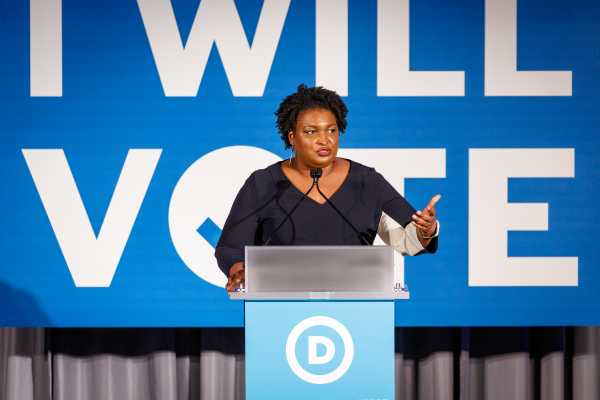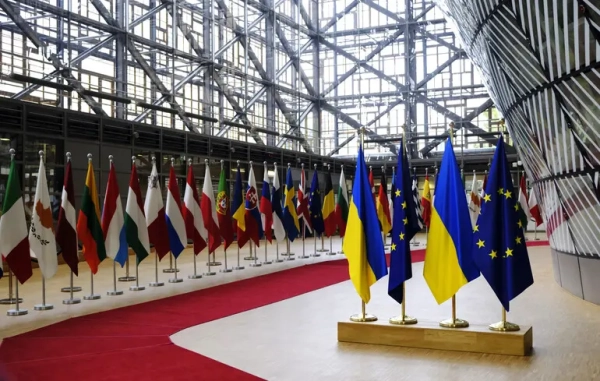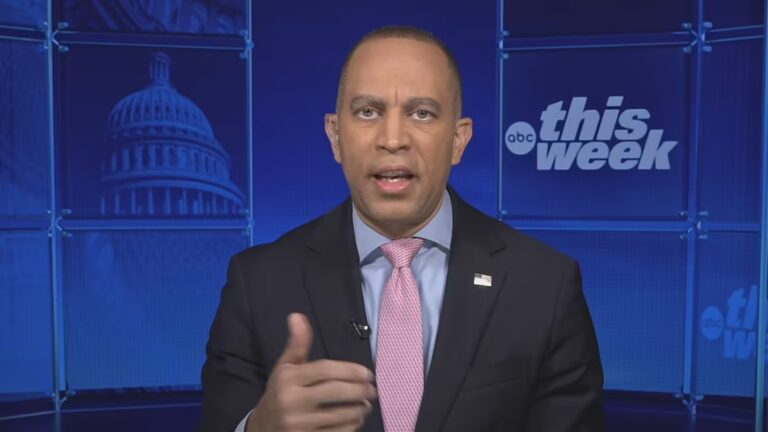
On Wednesday, Sen. Johnny Isakson, a three-term incumbent from Georgia, announced that he would retire from office at the end of 2019. For a brief moment, the Republican’s announcement reignited a question that has been lingering for months: Will this push Stacey Abrams, one of the highest-profile figures to emerge from the 2018 midterm elections, to run for national office?
It didn’t take long for Abrams, a former minority leader in the Georgia House and the first black woman to be a gubernatorial nominee for a major political party, to offer her answer — the same one she’s given at various points in recent months: Thanks, but I’m good.
“Leader Abrams’ focus will not change: she will lead voter protection efforts in key states across the country, and make sure Democrats are successful in Georgia in 2020,” an Abrams spokesperson said in a statement on Wednesday.
”While she will not be a candidate herself, she is committed to helping Democratic candidates win both Senate races next year.”
Related
Voter suppression is the most existential crisis in our democracy, according to Stacey Abrams
Abrams’s statement concludes the latest round in a cycle that began almost as soon as Georgia’s 2018 gubernatorial election came to an end. For months, there’s been speculation about whether Abrams — who came within 1.4 percentage points of becoming America’s first black woman governor last year but ultimately lost to then-Georgia Secretary of State Brian Kemp — would run for national office.
She’s been asked about running for president. She’s been besieged by rumors that she would join Joe Biden’s presidential ticket as VP (speculation that mostly ended after Abrams said that she wouldn’t run for second place). Mainly, though, she’s been the subject of repeated questions about a potential campaign for the Senate, with Senate Minority Leader Chuck Schumer saying that she’d be a good fit to challenge Republican Sen. David Perdue in 2020 (Isakson’s retirement now means that both of Georgia’s seats will be on the ballot).
So far, she’s declined all these options, saying that while she will certainly run for office again, she is still deciding what she will run for next (though in a recent New York Times interview, she seemed to reverse course somewhat, saying that she would be “honored to be considered” for a vice president position.)
The seemingly endless attention to her next step is undoubtedly a powerful indication of how high the star of Abrams — who also delivered the Democratic rebuttal to the 2019 State of the Union — has risen in the months since she ended her electoral bid. But how she is using that exposure today has nothing to do with getting elected and everything to do with ensuring equal voting rights for all.
“There are only two things stopping us in 2020: that people have a reason to vote, and that they have the right to vote,” Abrams said during a speech in Las Vegas earlier this month. “I’ve decided to leave it to a whole bunch of other people to make sure they have a reason to vote.”
In November, after spending more than a week fighting for all ballots to be counted, Abrams acknowledged that Kemp, who served in dual roles as candidate and Georgia’s chief elections official, legally won an election marred by allegations of voter suppression, Election Day voting issues, and legal fights over counting absentee and provisional ballots. But she also argued that while Kemp was the legal victor, the election had shown how unequal Georgia’s election system was for voters from marginalized backgrounds.
Abrams has since said that her experience in Georgia has left her focused on promoting the importance of protecting voting rights and fighting voter suppression. She’s spoken publicly about the importance of voting rights several times this year, writing op-eds in the New York Times, meeting with several Democratic presidential candidates, and discussing the matter during a June congressional hearing. And this focus often goes hand in hand with another success of Abrams’s 2018 campaign: her ability to energize a coalition of infrequent voters, voters of color, and liberal whites to go to the polls.
In August, Abrams announced that she would not seek the presidency and would instead spend the coming months working on Fair Fight 2020, an initiative that will seek to create and support voter protection efforts in 20 battleground states. While that decision has been met with a sort of begrudging acceptance from some Abrams supporters, it is likely that Abrams will have a far greater impact in her current work than in running for office.
“We’re going to have a fair fight in 2020,” Abrams said during the Vegas speech, “because my mission is to make certain that no one has to go through in 2020 what we went through in 2018.”
Fighting voter suppression has become an increasingly important issue in recent years
Data shows that Abrams’s effort is a worthwhile one. A surge of voting restrictions have emerged in the United States since the Supreme Court invalidated a portion of the Voting Rights Act in 2013, eliminating the formula that determined which states needed to have new voting laws preapproved by the federal government. In the years since the Shelby County v. Holder decision, controversies over ballot access and increasingly complicated laws disproportionately affecting voters of color have taken hold in states across the country.
According to the Brennan Center for Justice, a policy and research group that monitors new voting restrictions, there have been hundreds of “harsh measures making it harder to vote” introduced in state legislatures since 2010. Many of these were introduced after the 2013 Shelby ruling and, as a federal commission noted last year, have been seen both in states previously subjected to federal “preclearance” and states that were not.
These restrictions have taken many forms, including strict photo ID requirements, limitations on who can provide assistance at polling places, the curbing of early voting days, and the closing of hundreds of polling places across the US. Other measures — like the purging of voters from state voter rolls and drawing election districts in a way that curbs the power of voters of color — have affected how much power communities of color hold in elections. And these issues are poised to have an impact on voters in elections to come, including the 2020 election.
Abrams’s experience dealing with these issues predates her gubernatorial run. As the New Yorker’s Jelani Cobb noted in a recent profile of Abrams, she has been involved in electoral reform and voter registration efforts for more than a decade. And during the 2018 election in Georgia, her campaign worked with voters caught up in a number of voting rights difficulties, including the closure of hundreds of polling places, voter roll purges, and Election Day voting issues.
National attention to Georgia’s problems increased when the Associated Press reported that some 53,000 voter registrations, roughly 70 percent of them from black voters, had been put on hold by Kemp’s office for failing to clear an “exact match” process where registration information was compared to driver’s license and Social Security information.
In the days before and after 2018 election, Kemp was repeatedly a target of lawsuits, with civil rights groups arguing that various policies in the state disproportionately affected the voting rights of voters of color, young voters, and those with disabilities. Earlier this year, the House Oversight Committee announced that it would investigate allegations of voter suppression in Georgia as well as in Texas and Kansas.
Abrams’s group has also filed a lawsuit against Georgia elections officials, arguing that the state’s entire elections system is based on an unequal set of rules that negatively affect voters of color and must be changed as a result. Georgia officials tried to get the suit dismissed this spring, but a judge declined to do so. The case is expected to be heard in court next year.
In recent months, high-profile voting restrictions have called further attention to voting rights issues in various states. Texas, for example, was scrutinized this past spring for proposed legislation that would have imposed criminal punishments and fines on people who voted without knowing that they were ineligible. In May, Tennessee passed a law that punishes voter registration groups for submitting too many incomplete or inaccurate forms, a measure that groups say targets those who registered thousands of black voters in 2018.
And in Florida, where voters in 2018 overwhelmingly backed Amendment 4, a measure that would restore voting rights to Floridians with felony convictions, the state’s Republican-led legislature passed a law this year that requires people to pay all financial obligations connected to their sentence before they can regain their voting rights. The state is currently being sued by several civil and voting rights groups who argue that the law effectively functions as an unconstitutional poll tax that will primarily disenfranchise black Floridians with felony convictions.
This all suggests that heading into a presidential election year in 2020, and even in the years beyond that, fighting voting restrictions and expanding access to the ballot will be critical. “The minute it becomes about me or a single election, we missed the point,” Abrams told Recode’s Kara Swisher and Vox’s Ezra Klein in June. “This is about whether voters’ voices can be heard; it’s about whether citizens are allowed to be voters.”
Abrams’s new program could play a major role in fighting voting rights issues
When discussing the impacts of the 2013 Shelby decision earlier this year, voting rights advocates told Vox that one of the biggest consequences of the decision was that groups now had to spend more time suing over voting restrictions after they’ve already affected voters.
“Civil rights groups could be working on other things, but instead, we’re using our resources to deal with things that Section 5 (of the Voting Rights Act) would’ve addressed more easily,” Leah Aden, the deputy director of litigation for the NAACP Legal Defense and Educational Fund, told me in June.
Fair Fight 2020’s new voter protection initiative could help address some of these issues on the front end. As the Washington Post reported, Fair Fight will spend $4 million to $5 million on its upcoming initiative, and “will target 20 states, most of them battlegrounds in the Midwest and Southeast, and three states with gubernatorial elections this year: Kentucky, Louisiana and Mississippi.”
This money will be used to help set up and support local voter protection programs, helping local groups and organizers with voter hotlines, raising money for staffing, and educating the public about their voting rights, all in an effort to ensure that all eligible ballots cast are counted.
In doing so, Abrams joins a number of efforts to promote voting rights ahead of the 2020 elections. In Florida, Andrew Gillum, another prominent 2018 gubernatorial candidate who lost his bid, is working on Bring It Home Florida, a voter registration campaign that hopes to help Democrats turn the state blue next year.
And the Democratic Association of Secretaries of State has also recently launched an election-oriented initiative, this one focused on flipping five secretary of state offices from GOP control to Democratic leadership. The association also plans to launch a public education campaign that will highlight the importance of secretaries of state, who oversee elections and voting laws in nearly all the states in the US.
Collectively, these efforts could help voters, particularly voters of color, young voters, and other marginalized groups disproportionately affected by voting restrictions. And Abrams hopes her work in particular will also do something else: ensure that people who want to vote are able to do so, and that all votes count like they should.
“My focus has to be on making sure we preserve our democracy,” Abrams said in a recent interview with WBUR’s On Point radio program. “And that means fighting voter suppression where it occurs.”
Sourse: vox.com






